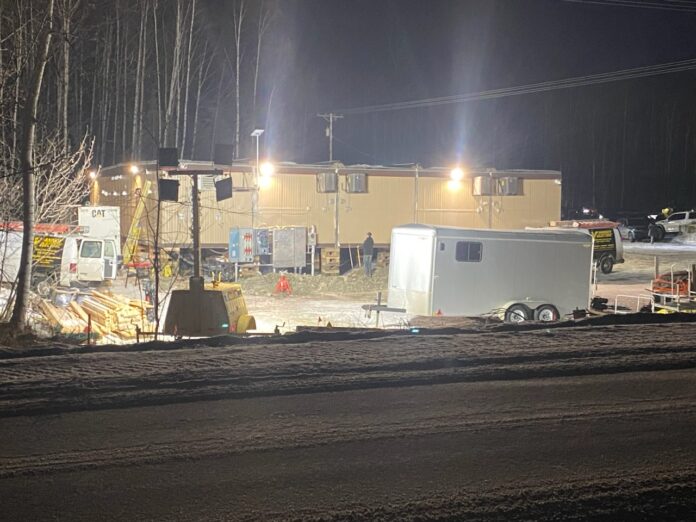The State of Alaska has filed a lawsuit in the U.S. District Court for the District of Columbia, challenging recent federal decisions that redefine jurisdiction over what are known as Native allotments in the state.
At the heart of the dispute is a decision by federal officials to grant the Native Village of Eklutna, based in Anchorage, jurisdiction over an individually owned Native allotment, known as the Ondola Allotment, which paved the way for gaming operations on the land.
The legal battle comes just as the Native Village of Eklutna has hurriedly opened a gambling operation near Peters Creek in Anchorage. The tribe contractors, operating under the supervision of a Las Vegas gambling developer, worked through the night to set up the Chin’an Gaming Hall, which consists of two trailers pushed together in a muddy construction site. The tribe moved swiftly to establish operations, fearing potential delays from the Trump Administration. However, the casino is already facing lawsuits from neighboring residents who object to its impact on the community.
Aaron Leggett, president of the Eklutna Native Village, called the casino opening a “historic milestone” for tribal self-determination. “Chin’an means ‘thank you’ in Dena’ina/Athabascan,” Leggett said. He assured that “safety and respect for our neighbors and customers are our top priorities,” despite opposition from local residents in what was once a quiet neighborhood.
While the casino is currently operating with strict capacity limits, it is expected to expand in the coming weeks. Leggett has emphasized that revenue from the gaming hall will help support housing, healthcare, employment, job training, scholarships, and cultural programs for the tribe. He also projects the casino will generate $67 million in economic activity for the municipality.
Alaska Attorney General Treg Taylor emphasized that the State’s lawsuit is not about gaming but rather about jurisdictional authority.
“We are asking the court to reaffirm what it has already said—the State maintains primary jurisdiction over Alaska Native Allotments,” Taylor stated.
The State argues the decision contradicts longstanding legal interpretations and a recent federal court ruling that upheld the State of Alaska’s primary jurisdiction over such lands.
The lawsuit, which names officials from the U.S. Department of the Interior and the National Indian Gaming Commission as defendants, contests a shift in legal interpretation that could significantly alter regulatory and public safety frameworks in Alaska.
The lawsuit cites the Alaska Native Claims Settlement Act of 1971, which resolved aboriginal land claims by establishing a system where Alaska tribes, except for Metlakatla, would not have territorial jurisdiction over land. According to the State, ANCSA intended for Alaska Native lands, whether owned by individuals or Native Corporations, to remain under State jurisdiction.
For decades, the Department of the Interior maintained that federally recognized tribes in Alaska did not have territorial jurisdiction over Native Allotments.
However, in February 2024, the DOI’s Solicitor issued a new legal opinion reversing this stance. This opinion served as the basis for the NIGC and Bureau of Indian Affairs to rule that the Ondola Allotment, a six-acre parcel in Chugiak leased to the Native Village of Eklutna, fell under tribal jurisdiction and was eligible for gaming.
The reversal by the Biden Administration agencies has raised numerous legal and regulatory concerns. The State’s complaint highlights uncertainties regarding law enforcement authority, hunting and fishing regulations, and state control over alcohol, marijuana, and environmental laws on these lands. The shift in jurisdictional authority could also impact property taxation and other State regulatory powers.
Meanwhile, the casino’s rapid haphazard opening exacerbated tensions between the tribe, the State, and local residents. While the Municipality of Anchorage has an interim agreement with the tribe to offset public safety costs, the casino is not subject to state or local taxes, raising further concerns about its economic impact.
The dispute follows a 2021 ruling by the District Court in the District of Columbia, which concluded that the Native Village of Eklutna did not have territorial jurisdiction over the Ondola Allotment. By contradicting this ruling, the State argues, federal agencies have overstepped their authority and disrupted long-established legal interpretations.
In its lawsuit, the State of Alaska contends that the DOI, NIGC, and BIA acted outside their authority and improperly altered the jurisdictional landscape without congressional approval. The lawsuit seeks to vacate the federal decisions and restore the legal status quo, reaffirming the State’s jurisdiction over Native allotments.
